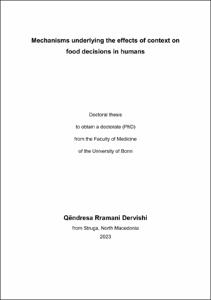Rramani Dervishi, Qëndresa: Mechanisms underlying the effects of context on food decisions in humans. - Bonn, 2023. - Dissertation, Rheinische Friedrich-Wilhelms-Universität Bonn.
Online-Ausgabe in bonndoc: https://nbn-resolving.org/urn:nbn:de:hbz:5-70932
Online-Ausgabe in bonndoc: https://nbn-resolving.org/urn:nbn:de:hbz:5-70932
@phdthesis{handle:20.500.11811/10863,
urn: https://nbn-resolving.org/urn:nbn:de:hbz:5-70932,
author = {{Qëndresa Rramani Dervishi}},
title = {Mechanisms underlying the effects of context on food decisions in humans},
school = {Rheinische Friedrich-Wilhelms-Universität Bonn},
year = 2023,
month = may,
note = {Food decisions are inevitable, frequent, and complex decisions with a high impact on our health. Understanding the mechanisms that underly food decisions has become a multidisciplinary endeavor over the last decades, particularly due to the high and increasing rates of obesity worldwide. Employing an influential framework from neuroeconomics, I conducted behavioral, eye-tracking, and fMRI studies to investigate contextual effects on food decisions and possible mechanisms underlying these effects. I focused on contexts that are commonly associated with food decisions and can be addressed at a larger scale, such as social factors and food marketing strategies.
In Publication 1, I investigated whether common social contexts impact food choices and whether such influences are mediated by the emotions that these contexts evoke. I found that lab-induced social contexts do not impact food choices, despite inducing emotions of different valence. These behavioral findings suggest that either the role of social contexts on food choices is limited or it may be more complex than assessed.
In Publication 2, my collaborators and I conducted an eye-tracking study to investigate the interplay between visual saliency, attention, and food choice. We found that salient nutrition labels shift attention allocation in favor of healthy food items and increase preference for these foods. These results support the use of salient instead of purely numerical labels to promote healthy food choices.
In Publication 3, I investigated the effect of nutrition claims on expected and perceived food attributes both at the behavioral and at the neural level (using fMRI). At the behavioral level, I found that nutrition claims elicit expectations about different food attributes, but do not impact perceived pleasantness. At the neural level, I found that claims at-tenuate activity in reward-associated brain regions during tasting otherwise equal milk-mix drinks, but not during swallowing them. These findings suggest that exposure may be a good strategy to “update” expectations, and to even promote acceptance of healthier food.
In summary, these findings indicate that context affects food-related decision-making through different mechanisms. This knowledge not only advances our understanding of food decisions in humans but can also be applied to improve them at a larger scale.},
url = {https://hdl.handle.net/20.500.11811/10863}
}
urn: https://nbn-resolving.org/urn:nbn:de:hbz:5-70932,
author = {{Qëndresa Rramani Dervishi}},
title = {Mechanisms underlying the effects of context on food decisions in humans},
school = {Rheinische Friedrich-Wilhelms-Universität Bonn},
year = 2023,
month = may,
note = {Food decisions are inevitable, frequent, and complex decisions with a high impact on our health. Understanding the mechanisms that underly food decisions has become a multidisciplinary endeavor over the last decades, particularly due to the high and increasing rates of obesity worldwide. Employing an influential framework from neuroeconomics, I conducted behavioral, eye-tracking, and fMRI studies to investigate contextual effects on food decisions and possible mechanisms underlying these effects. I focused on contexts that are commonly associated with food decisions and can be addressed at a larger scale, such as social factors and food marketing strategies.
In Publication 1, I investigated whether common social contexts impact food choices and whether such influences are mediated by the emotions that these contexts evoke. I found that lab-induced social contexts do not impact food choices, despite inducing emotions of different valence. These behavioral findings suggest that either the role of social contexts on food choices is limited or it may be more complex than assessed.
In Publication 2, my collaborators and I conducted an eye-tracking study to investigate the interplay between visual saliency, attention, and food choice. We found that salient nutrition labels shift attention allocation in favor of healthy food items and increase preference for these foods. These results support the use of salient instead of purely numerical labels to promote healthy food choices.
In Publication 3, I investigated the effect of nutrition claims on expected and perceived food attributes both at the behavioral and at the neural level (using fMRI). At the behavioral level, I found that nutrition claims elicit expectations about different food attributes, but do not impact perceived pleasantness. At the neural level, I found that claims at-tenuate activity in reward-associated brain regions during tasting otherwise equal milk-mix drinks, but not during swallowing them. These findings suggest that exposure may be a good strategy to “update” expectations, and to even promote acceptance of healthier food.
In summary, these findings indicate that context affects food-related decision-making through different mechanisms. This knowledge not only advances our understanding of food decisions in humans but can also be applied to improve them at a larger scale.},
url = {https://hdl.handle.net/20.500.11811/10863}
}






